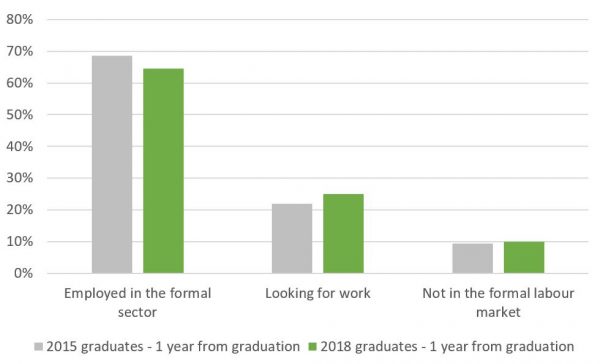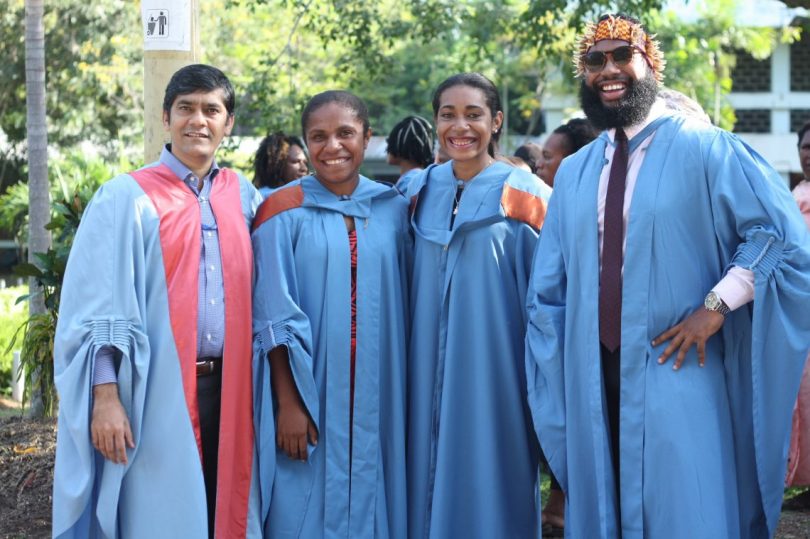In 2015, final-year economics students at the University of Papua New Guinea (UPNG) were surveyed as they completed their studies (blog here and report here). In 2017 and 2020, I ran the surveys a year or so after their completion of studies (2017 blog here and report here). The full report of the latest survey can be found here. This blog summarises some of the findings on employment outcomes.
The 2020 survey was sent to all students who completed their studies from 2015 to 2018, but in this blog I focus on the 2018 cohort, and compare their employment fortunes in early 2020 with those of the 2015 final-year class at the start of 2017. About 60% of the 2018 cohort responded to the 2020 survey (21 out of 35), just as 63% of the 2015 cohort responded in the 2017 survey (22 out of 35).
Generally, the results for 2020 are similar to those in 2017. Both surveys found that between 60% and 70% of students had found a job in the formal sector one year on from their completion of studies. Another 20% were looking for work. And another 10% were not in the formal sector (either undertaking further study, working in the informal labour market, or living in the village).
Employment outcomes, % of cohort respondents
The good news is that most who responded had found jobs. Many were working for prestigious government departments or private organisations.
The sobering news is that one in five respondents were looking for work more than a year after completing their studies. The survey was run online, and clearly those who have better access to the internet (e.g., at work), and are more successful in their careers, are more likely to respond. Almost everyone who responded was in Port Moresby, with a couple in Lae and Madang. This means that the results will likely be skewed to more positive employment outcomes.
Bearing this in mind, the employment rate for UPNG graduates a year after graduation is probably closer to 50% than 70%.
Private formal sector employment has been in decline for the last several years, and a higher percentage of new graduates were in government jobs in 2020 than 2018. There is also evidence presented in the main report that the 2018 students had to write more applications to get a job than the 2015 cohort. There is also now COVID-19, though the 2020 survey was largely completed before COVID-19 hit. Four 2018 graduates responded to the survey after the onset of the pandemic: two were employed, two unemployed; of those unemployed, one lost their position due to the pandemic.
Taken together, the results from both the 2017 and the 2020 survey suggest that the labour market does not have a large absorptive capacity for economics graduates. It might be the case that students are finding work in the informal sector, though we do not have evidence of this. And if UPNG economics graduates are struggling to find a job, then think how much harder it must be for students from other less prestigious degree programs and universities.
These findings support a strategy for a focus on education quality rather than quantity, as recommended by the Garnaut-Namaliu report on tertiary education. University education is not the only route to success. It is not useful either for graduates or employers to have more students in universities if there are not enough jobs. It is better to ensure that those who are selected get better trained.
More research like this is needed, with surveys that track the employment fortunes of graduating students from a range of disciplines and universities.
Date notes: The 2020 survey was conducted early in the year, mainly in January. The 2017 survey was conducted in late 2017, but students were asked to indicate when they found a job, and we compare employment status at the start of 2017 with employment status at the start of 2020.
Read the full report “University of Papua New Guinea economics graduates tracer survey 2020” here.



Thank you for publishing this. The UPNG programme worked wonders, but there is only so much you can achieve from the outside with young, enthusiastic lecturers.
In my view, all universities must produce employable, work ready graduates, which is not the same as job ready. In order to turn around PNG universities, the guidelines of the Namaliu/Garnaut 2009 report, the independent review of the PNG universities is still valuable: improve governance by reducing council, and focus on academic quality before increasing enrolment again.
At V-C at UNITECH we developed a strategy focusing on internationalization and professional accreditation of programs, converting IT capabilities into strengths, and partnerships with strong industrial and academic partners. Efficiency was another key goal, but that is per definition not a strategic goal.
Corruption, admission and academic corruption has to be stopped, existing faculty must be offered opportunities to do a PhD (between 2014-17 we sent 27 abroad) and the university’s reputation must be enhanced so that fully qualified lecturers with work experience at world-class universities can be attracted. Digitalization, professional accreditation and training to stimulate student-centred and competence based teaching must be vigourously undertaken.
At UNITECH from 2014 to 2017 we did an annual graduate employment survey 5-6 months after graduation. We found only 40% had formal employment. Development studies and management graduates did relatively well, much better than economics graduates. We also had monthly breakfasts with industrial training coordinators and employers of our graduates.
A very important question Sarah. Recently I went on the look out for Women economist’s across the Pacific and asked male economists I knew across a number of agencies. Interestingly, a number were named who we just never hear of, working in development banks, financial Institutions, governments, etc. across the Pacific. For instance Maiava Atalina Emma Ainuu-Enari was appointed Governor and Chairperson of the Board of the Central Bank of Samoa (CBS) in 2011 and remains so…these women economist’s seem to work quietly in the background, not taking up that space to articulate on public policy, financial issues through the media, etc as men do. Be great to hear more from and of them, so greater number of women get that due representation but other younger one’s get encouraged to take up that space. But yes that sex-disaggregated data would certainly give us a clearer idea in PNG and beyond. The newly launched SPC data Hub maybe a start.
The study doesn’t provide any sex-disaggregated data – can it be made available? Women tend to be under-represented in economics. Research conducted by the European Central Bank confirmed quite different career trajectories for male and female economists resulting in a lack of diversity in leadership and decision-making positions in central banks and other institutions. It would be interesting to know if this trend is the same in PNG.
Yes, it is the same in PNG – in the report linked at the end of the first paragraph I mention that the number of female economics graduates is typically just 10-25% of the total cohort. That said, the response rate of women to the survey was higher, and the employment rate for respondents is likely much higher for respondents than non-respondents – which suggests better employment rates. If you want any further information please feel free to send me an email rohan.fox@anu.edu.au